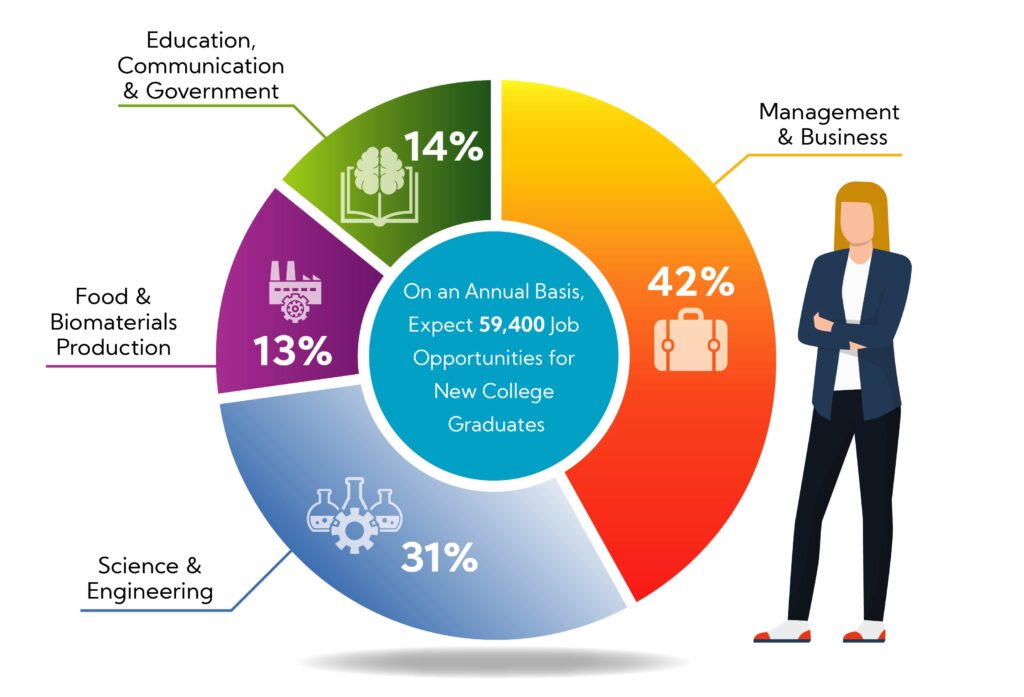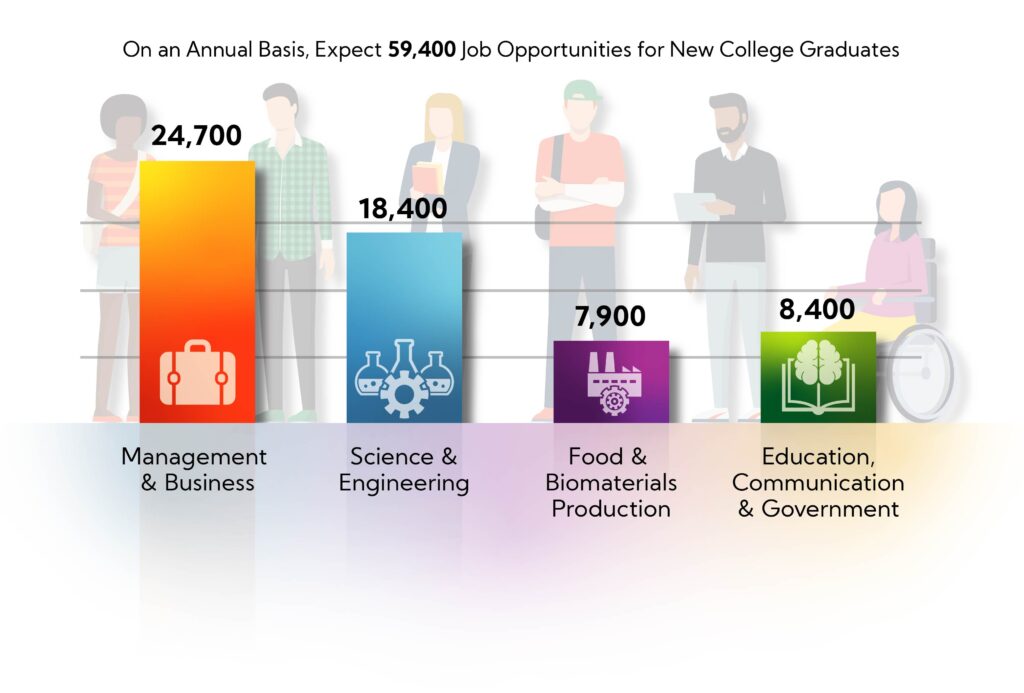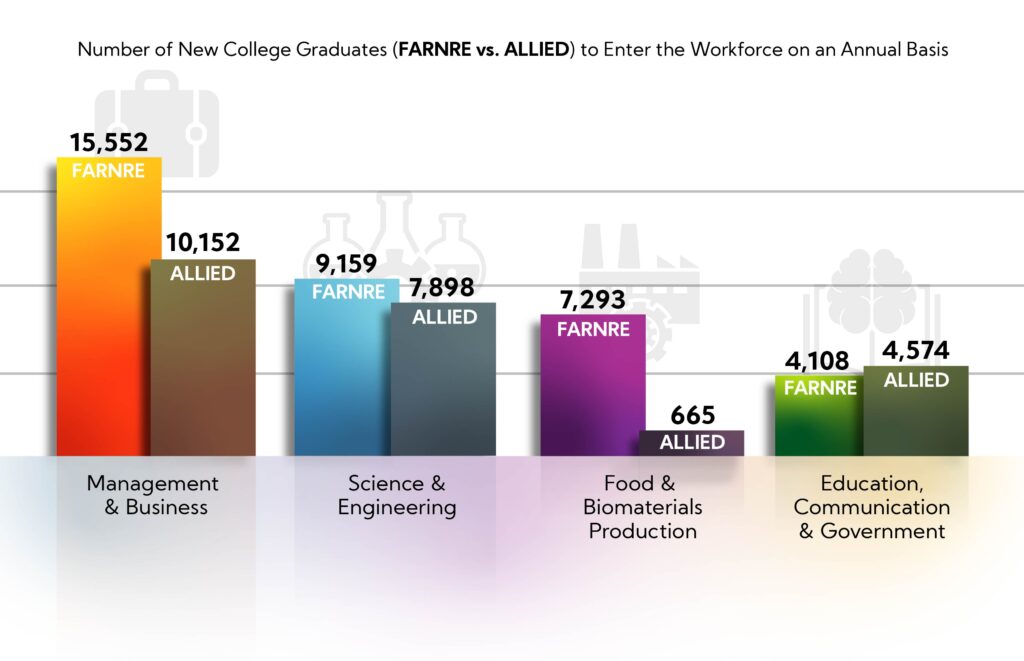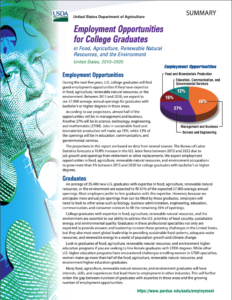Employment Opportunities
In the United States between 2020 and 2025 we expect employment opportunities to remain strong for new college graduates with interest and expertise in food, agriculture, renewable natural resources and the environment (FARNRE). Approximately 59,400 openings annually reflect a 2.6% growth in employment opportunities from the previous five years. Approximately 61% of the positions will be filled by new college graduates with FARNRE degrees, and the other 39% by new graduates with degrees from allied fields (biology, mechanical engineering, accounting, journalism, etc.).
Employer demand for college graduates with degrees and expertise in FARNRE disciplines will exceed the number of available graduates. Graduates earning FARNRE degrees will account for 61% (36,100) of the 59,400 new graduates entering the supply pool, while allied disciplines will comprise 39% (23,300).
Anticipate a strong demand for graduates with expertise in the following areas and for these positions.
Note: Although listed in their predominant cluster, some of these fields encompass occupations in more than one cluster — and in the case of data science, expect a strong demand in all of them.
Supply of Graduates
Management and Business
The Management and Business cluster includes business and management occupations aligned with the production, transportation, processing, and distribution of food and fiber, including the management of renewable natural resources.
- marketing, online sales and e-commerce specialists
- field technical service specialists, particularly with expertise in niche production systems
- financial advisors, lenders, credit analysts, business consultants, insurance and operations managers
Science and Engineering
The Science and Engineering cluster includes the life, physical, and social sciences and engineering occupations aligned with the production, transportation, processing, and distribution of food and fiber; and occupations focusing on the interface of food science, human nutrition and health.
- data science, analysis and engineering
- agronomy, plant breeding and genetics, forest science, and plant disease diagnostics and treatment
- automation and robotics
- precision management of agriculture and renewable natural resources, artificial intelligence (AI), remote sensing and geographic information systems (GIS)
- large animal veterinarians and veterinary practitioners in rural areas
- water quality and environmental specialists, environmental management and reclamation, and soil conservation and health
- climate and invasive species specialists
- epidemiology, vector biology, virology, infectious diseases, pharmaceuticals and toxicology
Food and Biomaterials Production
The Food and Biomaterials Production cluster includes occupations that focus on the production of commodities used as food or biomaterials, as well as those in forest production, renewable energy and environmental management.
- food technology, process engineers, packaging and biosafety
- commercial and intensive livestock and poultry production
- urban agriculture, forestry, horticulture, development of natural recreational and landscaped spaces, wildlife and conservation areas
- local foods and specialty culinary products and craft beverages
Education, Communication and Governmental Services
The Education, Communication and Governmental Services cluster includes educators, communicators and public relations specialists in the public and private sectors. A wide range of occupations are offered by local, state, national and international agencies.
- agriscience and natural resources teachers, high school and middle school
- extension and outreach personnel with specialties in community and small business engagement for rural and urban settings
- experts in agricultural, natural resources, environmental and rural policy
Diversity and Inclusion
Given the global nature of the food, agriculture, renewable natural resources and the environment sector, diversity and inclusiveness are both strategic imperatives and the basis for its workforce.
- Over the past two decades and across all levels of degree attainment, more females than males have graduated in food, agriculture, renewable natural resources and the environment.
- Some majors tend to attract a greater proportion of female students, including animal sciences, agricultural education, agricultural communication, veterinary medicine, etc.
- Other majors tend to attract more male students, including agricultural engineering, forestry, agronomy and crop science, etc.
- Attainment of bachelor’s, master’s and doctoral degrees by students from racial and ethnic minorities has steadily increased and is expected to continue increasing in the future to numbers that proportionally reflect those of society at large.
Report Series
This report is the ninth in a series of five-year projections initiated by the U.S. Department of Agriculture in 1980. This latest report was conducted during the global COVID-19 pandemic. To project the success and perseverance of current college students through graduation, let alone the employment opportunities awaiting these new graduates, was extremely challenging. Nevertheless, the project team strongly concludes that the need for graduates and available employment opportunities in the food, agriculture, renewable natural resources and the environment sector will remain steady and strong
Advisory Panel of Experts
Cindy L. Akers, Texas Tech University; Antoine J. Alston, North Carolina A&T University; Gary A. Blair, CARET, Mississippi State University; Penelope L. Diebel, Oregon State University; Michael C. Gaul, Iowa State University; Tracy S. Hoover, The Pennsylvania State University; Terry L. Sharik, Michigan Technological University; R. Elaine Turner, University of Florida; Mary M. Willis, California State University, Fresno
Authors
J. Marcos Fernandez, Purdue University; Allan D. Goecker, Purdue University; Ella Smith, U.S. Food and Drug Administration; Emma R. Moran, U.S. Department of Agriculture, NIFA; Christine A. Wilson, Purdue University
![USDA 2020-25 Employment Report Summary[2]_Page_1 Download USDA Employment Report Summary, 2020-2025](https://www.purdue.edu/usda/employment/wp-content/uploads/2020/12/USDA-2020-25-Employment-Report-Summary2_Page_1-232x300.jpg)



